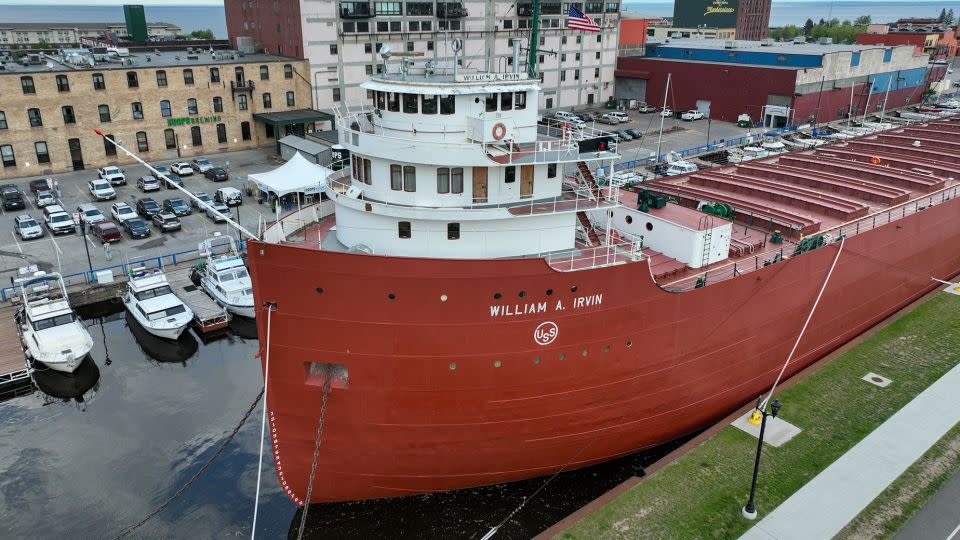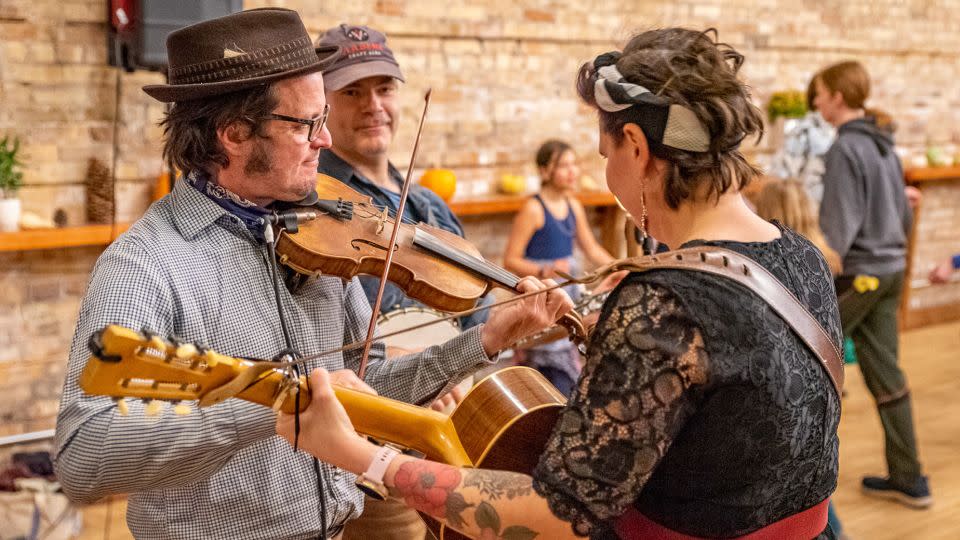‘It’s cooler by the lake’: Why Duluth is proving to be a Superior travel spot
unknown content item
-
It can be difficult to pin down the charm of Duluth in one easy phrase. It’s a small port city with an even smaller-town feel, nestled in the northern woods of the state, two and a half hours north of Minneapolis-St. Paul.
Duluth has a thriving outdoor community. It’s home to a multitude of breweries and other craft industries, and it fosters a vibrant art and music scene. The city somehow also caters to history buffs, foodies and families.
But is there one thing that describes Duluth and ties it all together?
“It’s cooler by the lake” — a local phrase that has been floating around Duluth in some form since its founding — might be the one. Perched on the shores of Lake Superior, the largest freshwater lake in the world by surface area, life in Duluth is ruled by the whims of the lake. And the lake likes to keep things cool.
It can be brutally cold in the winter months, but the cool weather feels more welcoming in the summer. At the time of year when the bulk of the United States swelters, Duluth rarely sees temperatures over 80 degrees F (about 27 C).
Over the past decade, Duluth has received a lot of attention as a “climate refuge” that is less likely to suffer from the worst effects of climate change. While the label is new, the cooler temperatures have brought in summer tourists looking to escape the heat and humidity for decades.
Lake Superior also supplies Duluth with some of the cleanest and freshest drinking water in the world, which makes for great drinking in more ways than one.
“It’s almost impossible to make bad beer in Duluth because of the water,” said Dave Hoops. He’s the owner of Hoops Brewing in Canal Park, Duluth’s original tourist haven. An accomplished brewmaster and longtime staple in the industry, Hoops has watched the craft beverage scene in Duluth go from a few local breweries to a thriving tourist attraction in its own right.
“The craft community is really tied into Duluth’s outdoor lifestyle,” Hoops said. Tourists come here to be out and about in nature during the day, then spend the evening unwinding at one or more venues. “We’re all interconnected and easy to get to,” he said.
Life on the lake

A visitor wouldn’t have to stray far from Canal Park to discover what he means.
Within the city limits, Duluth boasts more than 350 miles (560 kilometers) of trails. A lot are found in the city’s many wooded parks, but several different trails connect Duluth from end-to-end such as the Duluth section of the Superior Hiking Trail or the Duluth Traverse bike trails. From hiking, fat-wheel biking and bird-watching to ice wall climbing, kayaking and polar plunge clubs, Duluth has the outdoor enthusiast covered without a need to step foot in a car.
But you don’t have to be a hardcore outdoors person to enjoy this lakefront city.
Canal Park is a spit of land that juts into the lake from downtown Duluth at the corner of Lake Superior. It has likely been drawing crowds for over 100 years with people eager to watch ships pass through what’s now North America’s farthest inland freshwater seaport.
It wasn’t until the 1980s that the city began revitalizing the area in earnest. What started with a maritime museum and a half-mile walking path along the lakeshore has grown into one of the most-visited tourist attractions in Minnesota.
Shops, restaurants, hotels and event centers are clustered near the lakefront, along with attractions such as a historic 611-foot lake freighter turned museum (the William A. Irvin) that dominates the skyline and not-so-subtly hints at the area’s industrial and maritime heritage.
Within a short walking distance from Canal Park, a visitor can find the Great Lakes Aquarium, or walk, drive or bike across the city’s landmark Aerial Lift Bridge to access miles of sandy beaches along Minnesota Point (also called Park Point), the world’s longest freshwater sandbar.
The food and beverage scene is surprisingly robust for such a small city in a state historically known for its bland palate.
At the long-established Northern Waters Smokehaus in Canal Park, the best-selling Cajun Finn sandwich (“haus-smoked” Cajun salmon with green-onion cream cheese and veggies on stirato bread) is a great snack to pick up for an evening stroll along the nearly eight-mile paved Lakewalk.
Nearby Grandma’s Saloon & Grill has been offering local favorites – chicken wild rice soup and a walleye fillet sandwich – since 1976, with patio seating at the base of the lift bridge for some of the best lake and bridge views in the city.
Not far away sits the sprawling outdoor event space Bayfront Festival Park. Located just past the lift bridge on the shores of the harbor, concerts held here can be heard throughout the entire city. Smaller venues such as the aforementioned Hoops often feature local bands. On Thursday nights, the brewery hosts Vinyl Night, where an old-school DJ spins records while customers socialize and play board games in a family-friendly, German-inspired beer hall.
And for total immersion in the Duluth music scene, the first week in May brings the Homegrown Music Festival. In true Minnesota fashion, the event started 25 years ago as a community birthday party for a local musician and has since grown into a weeklong event featuring up to 200 bands.
‘Where Duluthians go to hang out’

Canal Park has long been Duluth’s tourist hub, a fact made obvious by the weekend crowds. A newer addition to the Duluth scene that offers an escape from the crowds is the recently revitalized Lincoln Park Craft District, located a few miles west of Canal Park (and connected by trail as well as road). Lincoln Park has a lot of similarities to Canal Park but with a smaller, more local feel.
Originally a smaller downtown area for the West End Neighborhood, the area fell on hard times during the Rust Belt years. The 1960s to ’80s were rough on Duluth all around, but Duluthians today are embracing the historical element of the city’s many old-time buildings, a trend that is showcased beautifully at the Duluth Folk School and its partner Dovetail Cafe & Marketplace in the heart of Lincoln Park.
“Our goal was to provide an inviting space where the community comes together to create and unwind,” said Tim Bates, co-founder of the Folk School. The facility opened in 2015 in a mercantile storefront dating back to 1915, an era when Duluth was rumored to have more millionaires per capita than any other city in the United States.
The renovated Folk School is a beautiful and charming example of Duluth’s passion for preserving these old buildings and highlighting its history. Originally housing a tea merchant, visitors today can run their hands along the original brick walls or look up and see the detailed square ceiling tiles.
The building also houses artistic communities with a space to teach and sell their wares, so travelers never know what will be happening when they stop in for a cup of coffee or lunch at the onsite Dovetail Cafe. You might overhear a group getting an introduction on how to forage for mushrooms or be able to peek in on people learning how to spin wool fiber. Just don’t be surprised if locals start folk dancing to a jam session.
“Lincoln Park is where Duluthians go to hang out,” Bates said.
Elsewhere along West Superior Street, there are more locally sourced arts, crafts and foods, such as artisan ice cream at Love Creamery or the vast array of handcrafted rugged outdoor essentials at Frost River. Bent Paddle, one of the city’s first craft breweries, is housed in an old brick furniture warehouse and proudly maintains the original signage – Enger & Olson Furniture Warehouse – alongside its own.
unknown content item
-
‘Connecting with nature and our community’
In keeping with Duluth’s outdoor allure, the Craft District is only steps from Lincoln Park (the namesake of the neighborhood). It’s a 37-acre green space in the heart of the city where visitors can hike, enjoy waterfalls, have a picnic or play disc golf.
The wonderful thing about Duluth is that Lincoln Park is not unique; the city has more than 100 parks and green spaces. On the east side of the city sits Lester Park, a rugged and active green space where two rivers meet just before emptying into Lake Superior.
“Lester Park is a hidden gem of Duluth,” said Megan Kress, owner and operator of Sauna du Nord, a mobile sauna service that often provides drop-in community sauna sessions in Lester Park.
“Duluth is the perfect location for a year-round sauna season,” Kress said.
Because Duluth cools off in the evenings, even in the summer, people can enjoy a community sauna then cool off with a quick dunk in the cool waters of the nearby Amity Creek.
“It would be difficult to find a more Duluth experience,” Kress said. “We love connecting with nature and our community.”
Though she’d likely be one of many to remind you: bring a coat. After all, it’s always cooler by the lake.
Which towns should we choose next?
Kathleen Murphy is a freelance writer who lives, writes and works in Duluth, Minnesota.
For more CNN news and newsletters create an account at CNN.com


